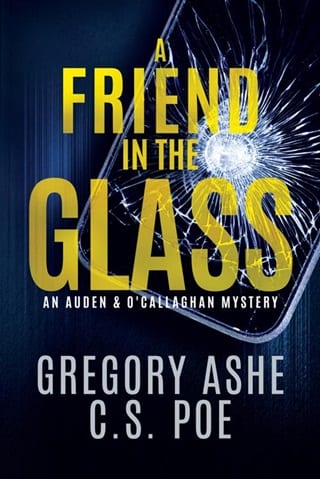Chapter Two
The honking on the street below never stopped. Sirens, twenty-four / seven. The radiators were always clanking, the pipes rattling, the boiler occasionally booming, the whole building like a pressure cooker about to blow. Jeopardy! at four from the apartment below. Duran Duran from the shit-for-brains next door, at any hour of the day, whenever the fancy struck him. Which begged the question, in Sam Auden’s humble opinion, of who the fuck had ever been struck by the need to listen to Duran Duran.
Sam thought maybe he needed to get out of the house.
Well, house was a generous term. He needed to get out of the apartment. The studio apartment. The small studio apartment. The tiny little fuckhole, if he was being technical, that in the greatest city in the world apparently was considered a reasonably sized space to live.
Ok, he thought. Maybe he needed to get out of the city.
Instead, he did the dishes, which were left over from the spaghetti Rufus had thrown together the night before and which were starting to smell. Nobody else might have noticed yet, but he did, and it was worse in the cramped quarters. He soaked the plates and the pot. He scrubbed the hardened red sauce with the brush. Then he went for the sponge. When that didn’t work, he banged the pot on the stainless-steel rim of the sink and muttered, “Fuck this shit.”
Scummy water, greasy with olive oil and speckled with tomato pulp, splashed across his shirt and jeans. The combination of the wet warmth and the smell sent him into overload. It wasn’t a panic attack, but in some ways, it felt like one. Racing heartbeat. Hyperfocused sensory awareness. The need to crawl out of his fucking skin, that was another good one. He clutched the countertop, knuckles blanching, and focused on his breathing until he felt a little less fried and a little more human.
The fluoxetine had been helping. But this was the city that never shut its fucking eyes, never gave a guy a break.
Stripping out of the soiled clothes, Sam told himself the meds did help. Still helped. He showered with Dr. Bronner’s Pure Castile Bar Soap, Baby Unscented, which sounded in his head like something a traveling medicine man might hawk from the back of a stagecoach. Lukewarm water. Pressure so low it might as well have been dripping out of the showerhead. He dried off with the towel that was perpetually damp and changed into clean clothes: jeans, a white tee inside out, socks inside out, boots.
The hamper was starting to smell too, so he added the clothes that were the victim of spaghetti water and carried the whole load downstairs to the laundry in the basement. He only had enough quarters for one load, so he packed the drum tight. Then he realized he’d forgotten the soap; he was still used to laundromats where he could buy it when he needed to. He left the clothes in the washer and hiked up the five flights of stairs. He got the detergent, some sort of free and clear gentle stuff that Rufus had found on sale, and took it back downstairs.
The washer was now chugging dourly. The clothes he’d loaded lay in a heap on the floor. He opened the washer’s lid, saw the Under Armour shorts and the Nike tanks, and decided that he was going to murder Gym Bro, 2A.
Some big-hearted super had, at some point, added a plastic chair to the laundry room. It had a wonky leg, and the one time Sam had sat in it, it had made a noise that had given Rufus something to laugh about for a week. Sam dropped into the seat, ignoring the metallic squeal of protest. He studied the laundry room. The two-tube fluorescent strip overhead had a cracked acrylic panel, and one of the tubes fluttered intermittently. On the far wall, Mrs. Costello had tacked red-foil letters that spelled out MERRY CHRISTMAS AND HAPPY HOLIDAYS. The artificial perfume of 2A’s detergent was underlain by the smell of perpetual moisture—something between mildew and wet wool, which Sam suspected was coming from the floor drain. The washer’s motor groaned as the drum spun. A pipe clanked. He’d heard fags burned in hell. Nobody had warned him about winters in Manhattan.
Rufus would be home. Eventually. If whatever he was doing—snooping, snitching, digging up dirt he could sell to Erik Weaver, his handler at the NYPD—didn’t keep him out late. And that was good. That was great. They’d talk. And Sam would ask about Rufus’s day. But then Rufus might want to go out for pizza. Or he’d want to see the library. Or it was the free day at a museum he hadn’t visited recently. And that would mean the subway, the smell of piss, the heat of bodies and trapped air, the stink of sweat trapped in winter coats. Or the sidewalk, the patterns Sam couldn’t suss out, taxis cutting through crosswalks, the flash of electric signage.
He closed his eyes. He pictured Arkansas. Outside Eureka Springs. April. The bluegrass coming back to life. The sound of a semi pounding past, the silent skitter of the gravel on the shoulder. A wall of air pressing against his cheek. Cow dung. The cottonwoods like old women bending over a creek far off in the pasture. The soundtrack was Howlin’ Wolf, and he was howling right after that smokestack lightning hit. Why don’t you hear. Why don’t you hear me cryin’.
That was when the chair gave out, and Sam landed on the leg where he’d been shot two months before.
 Fullepub
Fullepub 



